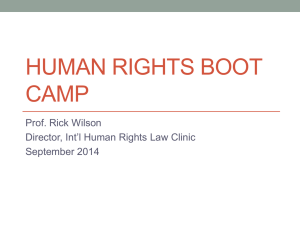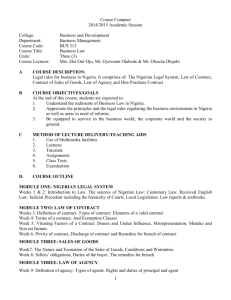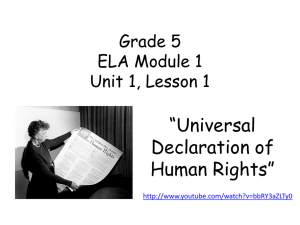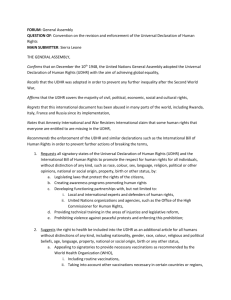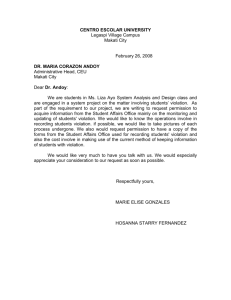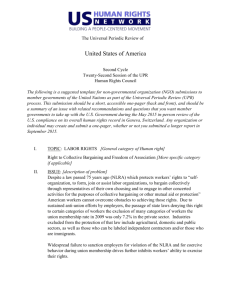When Rights Violate Rights: International Protection of Human Rights, Some
advertisement
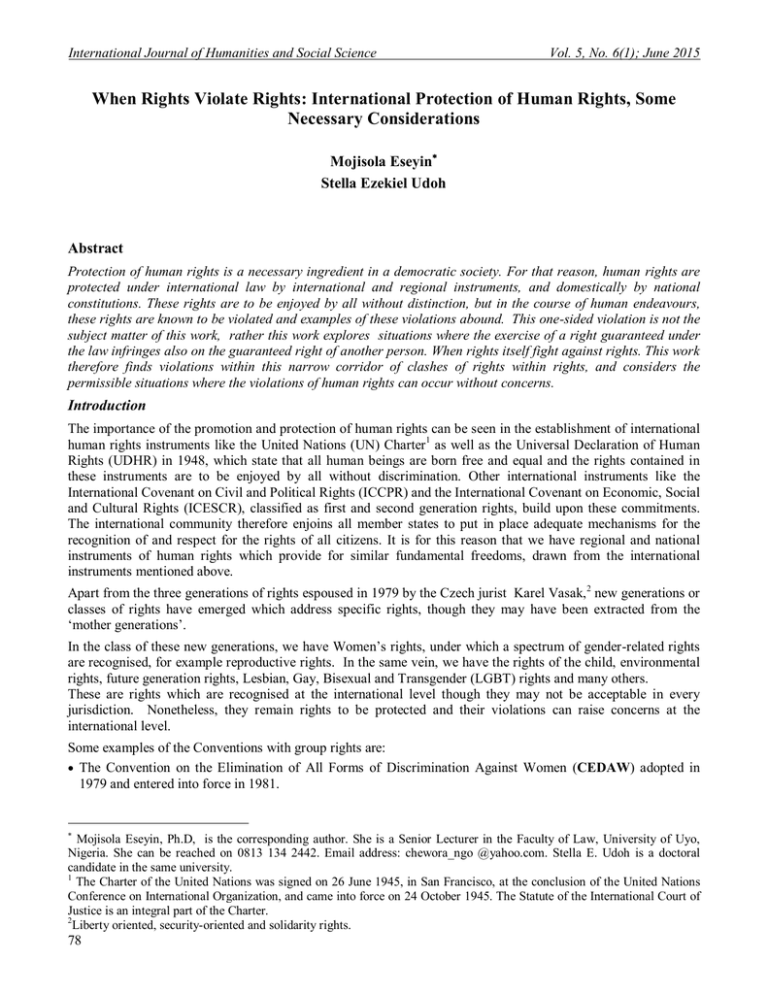
International Journal of Humanities and Social Science Vol. 5, No. 6(1); June 2015 When Rights Violate Rights: International Protection of Human Rights, Some Necessary Considerations Mojisola Eseyin Stella Ezekiel Udoh Abstract Protection of human rights is a necessary ingredient in a democratic society. For that reason, human rights are protected under international law by international and regional instruments, and domestically by national constitutions. These rights are to be enjoyed by all without distinction, but in the course of human endeavours, these rights are known to be violated and examples of these violations abound. This one-sided violation is not the subject matter of this work, rather this work explores situations where the exercise of a right guaranteed under the law infringes also on the guaranteed right of another person. When rights itself fight against rights. This work therefore finds violations within this narrow corridor of clashes of rights within rights, and considers the permissible situations where the violations of human rights can occur without concerns. Introduction The importance of the promotion and protection of human rights can be seen in the establishment of international human rights instruments like the United Nations (UN) Charter1 as well as the Universal Declaration of Human Rights (UDHR) in 1948, which state that all human beings are born free and equal and the rights contained in these instruments are to be enjoyed by all without discrimination. Other international instruments like the International Covenant on Civil and Political Rights (ICCPR) and the International Covenant on Economic, Social and Cultural Rights (ICESCR), classified as first and second generation rights, build upon these commitments. The international community therefore enjoins all member states to put in place adequate mechanisms for the recognition of and respect for the rights of all citizens. It is for this reason that we have regional and national instruments of human rights which provide for similar fundamental freedoms, drawn from the international instruments mentioned above. Apart from the three generations of rights espoused in 1979 by the Czech jurist Karel Vasak,2 new generations or classes of rights have emerged which address specific rights, though they may have been extracted from the ‘mother generations’. In the class of these new generations, we have Women’s rights, under which a spectrum of gender-related rights are recognised, for example reproductive rights. In the same vein, we have the rights of the child, environmental rights, future generation rights, Lesbian, Gay, Bisexual and Transgender (LGBT) rights and many others. These are rights which are recognised at the international level though they may not be acceptable in every jurisdiction. Nonetheless, they remain rights to be protected and their violations can raise concerns at the international level. Some examples of the Conventions with group rights are: The Convention on the Elimination of All Forms of Discrimination Against Women (CEDAW) adopted in 1979 and entered into force in 1981. Mojisola Eseyin, Ph.D, is the corresponding author. She is a Senior Lecturer in the Faculty of Law, University of Uyo, Nigeria. She can be reached on 0813 134 2442. Email address: chewora_ngo @yahoo.com. Stella E. Udoh is a doctoral candidate in the same university. 1 The Charter of the United Nations was signed on 26 June 1945, in San Francisco, at the conclusion of the United Nations Conference on International Organization, and came into force on 24 October 1945. The Statute of the International Court of Justice is an integral part of the Charter. 2 Liberty oriented, security-oriented and solidarity rights. 78 ISSN 2220-8488 (Print), 2221-0989 (Online) ©Center for Promoting Ideas, USA www.ijhssnet.com Convention on the Elimination of All Forms of Racial Discrimination (CERD) adopted in 1966 and entered into force in 1969 Convention on the Rights of the Child (CRC) adopted in 1989 and entered into force in 1989) United Nations Convention Against Torture (CAT) adopted in 1984 and entered into force in 1984). Some of the human rights in the conventions above are also protected by customary international law. 3 In this discourse, we shall not be limited to violations of rights within national climes only, but shall adopt a holistic approach to also consider the violations of these internationally recognised rights within the narrow corridor of double conflict of rights in the human rights system. Common to these international, regional or national instruments are the following basic human rights, just to mention a few. This is however without prejudice to the other rights in other human right instruments which will also be considered in this work. The right to life4Every human being has the inherent right to life protected by law and no one shall be arbitrarily deprived of his life. The right to personal liberty5Everyone has the right to liberty and security of the person and no one shall be deprived of his liberty except on such grounds and in accordance with the procedure established by law. Right to work6Everyone has the right to work, to free choice of employment, to just and favourable conditions of work and to protection against unemployment. Right to Dignity of Human Person7Everyone is entitled to respect for the dignity of his person, and shall not be subjected to torture, inhuman or degrading treatment… Freedom of assembly8Everyone has the right to freedom of peaceful assembly and association and no one may be compelled to belong to an association. Freedom of thought, conscience, and religion9Everyone has the right to freedom of thought, conscience and religion; this right includes freedom to change his religion or belief, and freedom, either alone or in community with others and in public or private, to manifest his religion or belief in teaching, practice, worship and observance. Right to education10Everyone has the right to education. Education shall be free, at least in the elementary and fundamental stages. Elementary education shall be compulsory. Technical and professional education shall be made generally available and higher education shall be equally accessible to all on the basis of merit. Right to development and self determination11All peoples shall freely dispose of their wealth and natural resources. This right shall be exercised in the exclusive interest of the people. In no case shall a people be deprived of it. All peoples have the right of self-determination. By virtue of that right they freely determine their political status and freely pursue their economic, social and cultural development. Right to Freedom from Discrimination 12Every individual shall be entitled to the enjoyment of the rights and freedoms recognised and guaranteed in the present Charter without distinction of any kind such as race, ethnic group, colour, sex, language, religion, political or any other opinion, national and social origin, fortune, birth or any status. 3 For example, the right of prohibition from torture, genocide, slavery and the principle of non-discrimination. Article 6(1) of International Covenant on Civil and Political Rights (ICCPR); Article 3 of the Universal Declaration of Human Right (UDHR); Article 4 and 5 of the African Charter on Human and Peoples’ Right (ACHPR); Section 33 of the 1999 Constitution of the Federal Republic of Nigeria. 5 Article 5 ACHPR, Article 9 ICCPR, Section 35 of 1999 Nigerian Constitution. 6 Article 23(1) UDHR, Article 6 ICESCR 7 Article 1 UDHR, Preamble to the UN Charter, Article 5 ACHPR , Section 34 of 1999 Nigerian Constitution. 8 Article 20 UDHR, Article 21 ICCPR, and Article 12 ACHPR, Section 40 of 1999 Nigerian Constitution. 9 Article 18 UDHR, Article 19 ICCPR, Article 9 ACHPR, Section 38 of 1999 Nigerian Constitution. 10 Article 13 ICESCR, Article 26 UDHR, Article 17 ACHPR. 11 Article 1 ICCPR, Article 1 ICESCR, Articles 20(1) and 21 ACHPR. 12 Article 7 UDHR, Article 2 ICCPR, Article 18 ACHPR, Section 32 of 1999 Nigerian Constitution. 4 79 International Journal of Humanities and Social Science Vol. 5, No. 6(1); June 2015 Freedom of movement13Everyone has the right to freedom of movement and residence within the borders of each state, including the right to leave any country, including his own, and to return to his country. Right to own property14Everyone has the right to own property alone as well as in association with others, and no one shall be arbitrarily deprived of his property. Right to marry and found family life15Men and women of full age, without any limitation due to race, nationality or religion, have the right to marry and to found a family… Marriage shall be entered into only with the free and full consent of the intending spouses. Right to participate in political process to freely choose representatives16Every citizen shall have the right and the opportunity, and without unreasonable restrictions to take part in the conduct of public affairs, directly or through freely chosen representatives; to vote and to be elected at genuine periodic elections which shall be by universal and equal suffrage and shall be held by secret ballot, guaranteeing the free expression of the will of the electors. Right to general satisfactory environment17All peoples shall have the right to a general satisfactory environment favourable to their development. Right to a standard of living, adequate for health18Everyone has the right to a standard of living adequate for the health and well-being of himself and of his family… The above rights are by no means exhaustive. What is Human Right Violation? It is doing something which amounts to a disrespect of the rights that are guaranteed under international, regional or national instrument, or doing something which is contrary to what the law stipulates as a recognition of human right.19It is failure or omission to do what is expected by law to protect human right. Therefore action and inaction can amount to a violation of human right where this is the subject of contention. Human rights violation can be said to occur when State, its agents, or non-state entities including individuals, abuse, ignore or deny basic human rights, including civil, political, cultural, social and economic rights, or breach any part of the UDHR or other international human rights treaty. Incidences of Violations of Human Rights within the Human Rights System It is common to come across a single or one-way violation of a right, but what is uncommon is where the exercise of a human right violates the corresponding human right of the other person within the human right system. It is this double conflict that is within the purview of this work which we shall consider. Freedom of Thought, Conscience and Religion Freedom of religion is an internationally recognized human right, also guaranteed in national constitutions like that of Nigeria.20 Pursuant of this right, some persons have gone ahead to form churches to propagate and express their religious beliefs. These beliefs are not universal, yet the pastors of these churches impose their beliefs on their congregations and some of their actions violate the rights of their members guaranteed under international instruments and national laws. Many instances of conflict of rights occur under the freedom of religion. Some of them are stated below. (i) Freedom of Religion v. Right to Life and Good Health (a)Pursuant to some religious beliefs, children who are accused of witchcraft are taken to the church for deliverance, and during these deliverance sessions, they are sometimes tortured to admit to being witches. 13 Article 13 UDHR, Article 12 ICCPR, Article 11 ACHPR, Section 41 of 1999 Nigerian Constitution. Article 17 UDHR, Section 43 of 1999 Nigerian Constitution. 15 Article 16 UDHR, Article 23 ICCPR, Article 10 ICESCR 16 Article 21 UDHR, Article 25 ICCPR 17 Article 24 ACHPR 18 Article 25 UDHRk 19 BemAngwe is the Executive Secretary, Nigerian National Human Rights Commission 20 Section 38 of 1999 Nigerian Constitution. 14 80 ISSN 2220-8488 (Print), 2221-0989 (Online) ©Center for Promoting Ideas, USA www.ijhssnet.com Some of them have died in the process because of the inhuman treatment they receive, thereby violating their right to life and the right to be free from torture. (b) Some religious practices21 also condemn blood transfusion in all circumstances and urge their members not to accept it no matter their condition. These adherents refuse blood transfusion even though it is the only means of regaining their health and saving their lives. Some patients have actually lost their lives based on their ignorance. This is an example where the freedom of religion of one man, violates the right to health and also the right to life of another. (ii) Freedom of Religion v. Right to a General Satisfactory Environment, and Private Life Pursuant to expression of religious beliefs also, some churches carry out night vigils and crusades with loud and disturbing noises blaring from their loudspeakers and musical instruments mostly directed away from their property to the public environment. On some occasions, neighbours have actually abandoned their houses to seek refuge elsewhere because the noise interferes with their peaceful environment, depriving them of their much needed rest. In some other cases too, this had led to some medical condition of high blood pressure in some people who are prone to this condition where they do not have sufficient rest. An example is a recent case in Lagos where one aged woman, Mrs. Esther Ogunsalu sued the Redeemed Church of God for disturbing her peace and triggering off her hypertensive disease.22 A move by the Lagos State Government through its agency, the Lagos State Environmental Protection Agency under the National Policy of Environment and Noise Pollution to halt the proliferation of churches in residential quarters and sanitize this menace, has been criticized by the church members as an infringement on their freedom of religion and beliefs. This shows clearly the conflict of the freedom of religion with the corresponding right of another to a satisfactory environment, and also the right to private life. 23 (iii) Freedom of Religion v. Right to Work and Take Part in Political Process The right to free choice of employment and to choose a profession of one’s choice as guaranteed under the UDHR and other human rights instruments stated earlier is breached when the pastor of a church, pursuant to the expression of his own religious beliefs, prohibits the members of his congregation from choosing particular profession like military and participating in politics, a right which they have. This practice is prevalent in Deeper Life and Jehovah Witnesses churches. This is clearly a violation of rights within rights. (iv)Freedom of Religion v. Right to Non-Discrimination A person’s right to religious belief or opinion should not be exercised in such a way as to violate the right to nondiscrimination of another. This was the decision in the United Kingdom’s Supreme court case of Bull v. Hall 24 where the hotel owners, in pursuit of their religious belief as devout Christians, denied same sex couples their choice of a double bedded-room in their hotel, simply on the grounds that they were gay, and stating that the facility was only reserved for heterosexual couples. The gay couples brought a claim for discrimination on grounds of sexual orientation against the hotel owners. The defendants were held guilty as such discrimination was unjustified, regardless of their religious belief. Civil and Political Rights The right to participate in the political process of freely electing representatives in a freely conducted universal suffrage is the cornerstone of the International Covenant on Civil and Political Rights and related instruments. It also guarantees the right to vote and be voted for. In Nigeria, for instance, according to the Executive Secretary of the Human Rights Commission in Nigeria, civil and political rights are the highest forms of violations, given the nature of petitions and complaints they receive. 25 We shall consider how these rights are violated and the corresponding right that is violated. 21 The Jehovah Witness is a classical example. http://www.naigagists.com/woman-sues-redee,ed=rccg-church-over-noise-pollution-in-in-lagos accessed 11 December 2014. 23 Private life is a right guaranteed under Section 37 of 1999 Nigerian Constitution. 24 (2013) UKSC 73; (2013) 1 WLR 3741. 25 Professor Bemangwe, ‘Violations of political, civil rights is on the rise in Nigeria’ (4 April 2014) available at http://www.sunnewsonliner.com/new/?p=58687 accessed 6 December 2014. 22 81 International Journal of Humanities and Social Science Vol. 5, No. 6(1); June 2015 Political Rights v. Right to Non-Discrimination (i) The issue of ‘god-fatherism’ This is rife in Nigerian politics. When the government or a political figure usually referred to as ‘ a god-father’, arbitrarily picks or ‘anoints’ a particular candidate for a position, over and above all other available candidates presenting themselves for election, he uses all available machinery to ensure the emergence of the candidate of his choice, even if the person does not enjoy the confidence and support of the electorate. The electorate is coerced and induced with some financial rewards to toe the line of the godfather, while the other candidates are sometimes intimidated through the obnoxious and contrary practice of ‘Option A4’26 against what is constitutionally provided for in the electoral law. Acting out of fear of what might befall them should they revolt against the godfather’s choice, they vote against their conscience, thus violating their right to freely choose. And for the candidate seeking election, he or she is intimidated with threats to life and can succumb to these external pressures out of fear as well, thereby depriving him the right to be voted for. In this circumstance therefore, the right of a candidate to be voted for is violated by the violation of the right occasioned by the ‘god father’, of an electorate to freely make its choice, by a ‘godfather’. (ii) For the right to non-discrimination, violation may have a cultural foundation where women are not treated equally with men, nor given equal opportunity to contest with men merely on the basis of gender differences. Their right under the covenant to be voted for is thereby violated, as well as right to equal treatment which is guaranteed under the UDHR, ICCPR, ACHPR, American and European Conventions on human rights. At the same time, the electorate is denied the right to make informed choices which may have been in favour of the woman as a viable alternative, where the available men are not qualified for the office they seek. This also violates the right to freely vote. Environmental Rights The right to a healthy or satisfactory environment can be considered as one of the emerging substantive human rights. This right is classified under Article 24 of the African Charter of Human and Peoples’ Right and Article 11 of the San Salvador Protocol to the American Convention on Human Rights. Other rights are derivable from this right, for example, the right to life, the right to health, the right to family life, the right to property. Therefore a breach of the right to a healthy environment, invariably leads to a violation of the other rights derivable from the environment, including the right of the present and future generations as shown below. (i) Right to a Healthy Environment v. Right to Life and Right to Health A healthy environment presupposes a good and satisfactory environment with full potentials of living with human dignity and attaining optimum health. But in Gbemre v. Shell Petroleum Development Company,27 the environment became unhealthy due to the side effect of exploration activities of Shell Petroleum Development Company, as the plaintiff complained that gas flaring by the Shell Company polluted the environment and therefore affected his health and ultimately threatening his right to life. The plaintiff’s claim was upheld by the court. (ii) Right to a Healthy Environment v. Right to Development The right to development is guaranteed under the ICCPR, ICESCR, ACHPR, and impliedly provided for in Resolution 1803 Permanent Sovereignty Over Natural Resources with the right for developing countries to exploit their natural resources for economic development. The development of this resource however leads to oil spills, polluting the environment and violating the right to a healthy environment, family life, right to work and others as the case of Social Economic Rights Actions Centre (SERAC) and Another v. Shell Petroleum Development Company & Nigeria28shows. 26 A system where the delegates are made to line up or stand behind the candidate that has been ‘anointed’ for them by the godfather, who himself will be present at the venue to ensure that they fall in line with the directive ‘from above’. 27 (2005) African Human Rights Law Report (AHRLR) 152. 28 (2001) AHRLR 60. 82 ISSN 2220-8488 (Print), 2221-0989 (Online) ©Center for Promoting Ideas, USA www.ijhssnet.com In the SERAC’s case above (The Ogoni case), which was brought under the African Charter of Human and Peoples Rights, the Nigerian government was held to have colluded with Shell Company to degrade the Nigerian environment in the course of exploration of petroleum resources, and has breached the right to life and some other rights granted to the people under the Nigerian Constitution and the African Charter. However, if the development of the resource is terminated, then there will also be a violation of the right to development granted the government under the same Charter. This is another example of rights violation within rights. The right to work is also violated when as a result of oil spills which poisoned the marine environment and killed the fishes in it, the local fishermen can no longer carry on with their fishing activities. This also violates their right to economic subsistence and family life. (iii) Future Generation Rights v. Right to Development This is one of the emerging new rights in environmental concerns. The present generation has a legal responsibility towards the future generation to ensure that their needs are fully safeguarded by presently adopting developmental patterns and standards that will preserve the environment in other to save the ecosystem for the future generation to meet their own needs. The responsibility is entrenched in the 1997 Declaration on the Responsibilities of the Present Generation Towards the Future Generation29which was adopted by United Nations Educational, Social and Cultural Organization (UNESCO), based on the aims of United Nations Charter, the UDHR and other relevant instruments of international law. Good as this may seem, it violates the rights of the present generation to development. For example, in Nigeria now, we are faced with the challenge of economic meltdown due to the falling price of oil per barrel, and the resource is the mainstay of the Nigerian economy. The tendency may be to adopt economic policies for the survival of the present generation, which may adversely affect the environment and infringe on the right of the future generation yet unborn. However, with the principle and practice of sustainable development, that delicate balance of environment and development can still be maintained. (iv) Right to Development v. Indigenous and Minority Peoples’ Right The right to development also violates the rights of minorities and indigenous peoples to own property, as their ancestral lands are acquired in the course of development and their sacred practices and traditions are desecrated. Women’s Rights Women’s rights cut across a whole spectrum of rights, and they are susceptible to violation in many ways. The thrust of the Beijing Conference held almost twenty years ago was to address the issues of inequality, violation and protection of women’s rights. Very little has changed since then. However, instances where their rights are violated with corresponding violations of other rights are given below. (i) Reproductive Rights v. Right to Life and Religion During the United Nations International Conference on Human Rights, in 1968, reproductive rights were first established as a subset of human rights,30 and includes some or all of the following rights: the right to safe or legal abortion, the right to control one’s reproductive functions, including the number of children desired and the spacing required, the right to education and access to information in order to make reproductive choices free from coercion or violence. It also includes the right to education about contraception and sexually transmitted infections, protection from gender-based practices such as female genital cutting (FGC) and male genital mutilation (MGM).31 29 Article 1 of the Declaration states that ‘the present generations have the responsibility of ensuring that the needs and interest of present and future generations are fully safeguarded’. 30 Freedman, P. Lynn, Isaacs, Stephen L. , (Jan – Feb 1993) ‘Human Rights and Reproductive Choice’ Studies in Family Planning (Population Council) (Jan – Feb 1993) 24 (1) pp 18-30. 31 Stop Violence Against Women: Reproductive Rights. Amnesty International USA. 2007. Retrieved December 8, 2007. Reproductive rights – access to sexual and reproductive healthcare and autonomy in sexual and reproductive decision-making – are human rights; they are universal, indivisible, and undeniable. These rights are founded upon principles of human dignity and equality, and have been enshrined in international human rights documents. 83 International Journal of Humanities and Social Science Vol. 5, No. 6(1); June 2015 (a) In some jurisdictions, abortion is prohibited. Some Christian religions like the Catholic Church and other Prolife organizations campaign against abortion, as it amounts to taking the life of the unborn child. However in United States abortion is a right exercised under the reproductive right of the woman as illustrated above. This right is regarded as a violation of the right to life of the unborn child. (b) Some cultures insist that cultural practices of FGC should be carried out on the females. Although this can be seen as a right to socio-cultural practice in a community as guaranteed under the human right system, the same practice is a violation of the right against torture and the right to human dignity guaranteed within the human right system as well, because of the process to be undergone to attain the objective of FGC. Rights of the Child The Convention on the Rights of the Child32 changed the way children are viewed, they are seen to have a distinct set of rights as human beings instead of being regarded as passive objects of care and charity, and there is a global commitment to advancing these rights.33 Special rights for the child, including all the rights of adult guaranteed under various human rights instruments are also enumerated in this Convention. Instances of conflicts of these rights are shown below. Right to a Family Life v. The Right of the Child to Education Parents have rights over their children and determine what is best for them with regards to family life. These children also have rights under the law to be protected by parents and the society. Sometimes the right of a parent over the child conflicts with the guaranteed rights of the child. For instance, in the exercise of parental right, some parents would rather have their children hawk items for sale in order to earn income for family use, than the child going to school, not minding the law that recognizes the right of the child to be protected from economic exploitation and from performing any work that is likely to be hazardous or to interfere with the child's education, or to be harmful to the child's health or physical, mental, spiritual, moral or social development, 34 thereby violating the child’s right to education guaranteed by Article 28 of the Convention. Right to marry and found a Family v. Freedom from Abuse (Child Marriage) The Nigerian Child Rights Act of 2003 protects children from abuses and discrimination, and makes it illegal to marry off a child below the age of 18.35 Child marriage is prevalent in the Northern part of Nigeria and conflicts with the Sharia law and customs and cultural expectations in different regions. In Nigeria, about 43% of women are married off under 18 years old36 against the right of the child. Some are given out in early marriage for economic benefits to the parents in violation of the child’s rights. Also, the right of a man to marry someone of his choice and found a family under Muslim law may also be said to be violated. It is on record that Nigeria has the highest global rate of vesico vagina fistula (VVF), an odious health condition caused by early pregnancy and the resulting child birth by these young girls who themselves are victims of child marriage. This condition violates the right of these children to good health. Social Rights and Equality They constitute right to respect for private life and the right not to be discriminated against based on Articles 17 and 26 of the ICCPR and Articles 8 and 14 of the European Convention on Human Rights. Under this class of rights, the gay rights have been expressed. LGTB Rights These rights relate to expression of sexual-orientation and gender identity. The rights are however controversial in some countries. 37 In Nigeria for example, in 2013, the National Assembly passed the Same Sex Marriage Prohibition Act, which prohibits gay marriage and allots fourteen years in prison to those engaged in same-sex relationships. 32 Adopted by General Assembly Resolution 44/25 on 20 November 1989 and entered into force 2 September 1990. http://www.unicef.org accessed 10 December, 2014. 34 Article 32 of the Convention on the Rights of the Child. 35 Sections 21 and 23 of the Child Rights Act. 36 Jain, Saranga and Kurz, Kathleen, ‘New Insights on Preventing Child Marriage: A Global Analysis of Factors and Programs’ International Centre for Research on Women, April 2007. 37 As at 2011, homosexual behaviour is illegal in 76 countries and punishable by execution in seven countries. See ‘World Day Against Death Penalty’ ILGA Retrieved August 29, 2010. 33 84 ISSN 2220-8488 (Print), 2221-0989 (Online) ©Center for Promoting Ideas, USA www.ijhssnet.com This Act also stipulated punishment for those knowingly associating with those identifying as members of the LGBT community or aiding these individuals in becoming married or pursuing that lifestyle. The punishment for abetting gay marriage is a term of imprisonment. 38 This law has been criticized as infringing on the right of nondiscrimination of the gay people and violating the right of the individual to freedom of association. The Right to Bear or Own Arms V. Right to Life In countries like the USA, the right to bear or own arms is a constitutional right. In common law jurisdictions, the right to bear and keep arms has been a long standing recognised right, pre-existing in common law, prior even to the existence of national constitutions. 39 (a) In the exercise of this right, and according to recurrent happenings in the United States, you have situations where students carry guns to school. Some of these students are delusional, have mental or psychological disorders and they have used these guns to shoot and kill other students who have the right to life guaranteed under the constitution, thereby violating this sacred right. Because of these events, there is an on-going debate on the need to abolish this right especially by concerned parents and the government, but majority of the people have opposed and resisted this idea as being their constitutional right to own guns, regardless of the right to life that may be violated. (ii) Another classical example is the case of the famous South African amputee athlete, Oscar Pristorious who killed his girlfriend Reeve Camp, in the mistaken belief without ascertaining, that she is a trespasser on his property. It is clear that he has the right to protect himself and his property, but in the exercise of this right he infringed on the right to life of his girlfriend, Reeve Camp whom he shot and killed, even under the guise of ‘protection of self and property’. Doctor-Patients Relationship V. Human Rights Provisions The information obtained by a medical doctor from a patient in the course of their relationship is governed by ethical standards of the medical profession not to divulge or disclose such information as it is deemed privileged. The same relationship can constitute a human right under freedom of opinion and expression to be protected, and capable of being violated. Two situations will be considered under this right: (i) A patient diagnosed of HIV/AIDS and the right of the patient to be protected from discrimination. (ii) Euthanasia – mercy killing, where a patient requests a doctor to assist him voluntarily end his life in order to put an end to his misery and unbearable suffering as a result of his terminal ailment. (i) Right to freedom of Expression v. Right to Private Life/Non-discrimination Right to freedom of expression includes the right to receive and send information and to be educated on a given situation. For the HIV/AIDS patient example given above, the right to private life40 and non- discrimination will however be violated should this information become public knowledge because of the stigma which is usually associated with HIV/AIDS. But because of the danger the patient poses to the public if the necessary preventive steps are not taken which can only be done if such information is made public, then public health will be at risk. The right of the doctor to freedom of expression then becomes an obligation and will be violated if he is restrained. (ii) Right to Human Dignity/Personal Liberty v. Right to Life This is with regard to euthanasia.41 Euthanasia is the act of deliberately ending a person’s life through the doctor’s assistance who administers lethal drugs by injection to end his suffering. The Netherlands is the only country in the world where euthanasia is openly practiced. Though it is not specifically allowed by statute, but Dutch law accepts a standard defence from doctors who have adhered to official guidelines hinged on the voluntariness of the request and the unrelieved nature of the suffering.42 38 Adigun, Bashir and Gambrell, Jon. “Nigeria Anti-Gay Marriage Bill Approved” Huffington Post, May 30, 2013. McAffee, Thomas B., Michael Quinlan, ‘Bringing Forward The Right to Keep And Bear Arms: Do Text, History, Or Precedent Stand In The Way?’ (March 1997) North Carolina Law Review, p. 781. 40 This right is guaranteed under Section 37 of the 1999 Nigerian Constitution 41 This is sometimes referred to as ‘physician-assisted suicide’ (PAS). 42 Information available at http://www.medicinenet.com accessed 16 December 2014. 39 85 International Journal of Humanities and Social Science Vol. 5, No. 6(1); June 2015 Proponents of euthanasia argue that the right to die is protected by the same constitutional safeguard that guarantees such rights as marriage, procreation, and the refusal or termination of life-saving medical treatment. They also contend that terminally ill people should have the right to end their suffering with a quick, dignified and compassionate death. 43 Therefore in the second example given above on euthanasia or ‘mercy killing’, a man has the right to human dignity and a right to freely choose what he wants. If he chooses to end his life due to the present unbearable and undignified human condition he finds himself as a result of the terminal ailment he suffers from which will eventually end his life but not knowing when, and decides to end his life in order to maintain some form of human dignity, it is his personal choice to do so, as a right. Active euthanasia is currently only legal in Belgium, Holland and Luxemburg. Under the laws in these countries, a person’s life can be deliberately ended by their doctors or other healthcare professionals under three criteria: (i) The person has made an active and voluntary request to end his life (ii) The person has sufficient mental capacity to make an informed decision regarding his case. (iii) It is agreed that the person is suffering unbearably and there is no prospect for an improvement in the condition. Therefore to deny this request to a terminally ill patient who wants to shorten his suffering on earth, is a violation of his right to personal liberty or right to choose. Conversely, opponents of euthanasia reflecting on the Hippocratic Oath, contend that doctors have a moral responsibility to keep their patients alive, and that there may be a “slippery slope” from euthanasia to murder. Furthermore, they argue that legalizing euthanasia will unfairly target the poor and disabled and create incentives for insurance companies to terminate lives in order to save money.44 Under English law, both euthanasia and assisted suicide are illegal and regarded as manslaughter or murder and is punishable by law with penalty up to life imprisonment. However, many jurisdictions outlaw this procedure because of the sanctity and the right to life. A medical doctor who holds the right to life inviolable will refuse such request as it may violate his right to his religious or other beliefs. This is an example of conflict of rights violations within the human right system. Exceptions to Violations of Human Rights Human rights are to be enjoyed with due regard and consideration to the rights of others, therefore their enjoyment is not unlimited. According to the UDHR: ‘everyone shall be subject only to such limitations as are determined by law solely for the purpose of securing due recognition and respect for the rights and freedoms of others and of meeting the just requirements of morality, public order and the general welfare in a democratic society.’45 Affirming these possible limitations, the ICESR provides that: ‘enjoyment of right provided by the State to be limited by State only by law compatible with the nature of the rights and for the purpose of promoting general welfare in a democratic society’46 Therefore violations are permissible under the following circumstances: 1. For Public Safety and Health Public health overrides the dictate of ethical profession. In the example given earlier concerning the HIV/AIDS patient and the doctor, such privileged information cannot be kept away from public knowledge so that the necessary measures can be taken to safeguard and protect public health. Besides, the confidentiality between the doctor and the patient is not a right guaranteed under the law, and in the event that it is argued to be, such freedom of information necessary for the protection of public health and safety is one of the grounds on which this violation of human right is allowed. 43 http://www.euthanasia.procon.org accessed 16 December 2014. http://www.euthanasia.procon.org accessed 16 December 2014. 45 Article 29(2) UDHR. 46 Article 4 ICESCR. 44 86 ISSN 2220-8488 (Print), 2221-0989 (Online) ©Center for Promoting Ideas, USA www.ijhssnet.com 2. National Security Human rights are usually curtailed in the time of national emergency or for national security purposes. This exception is recognised under the United Nations, but it must be done under special circumstances: the emergency must be actual, it must affect the whole population and the threat must be to the very existence of the nation. The declaration of emergency must also be a last resort and a temporary measure. Recommendations/Redress for Human Rights Violation We have seen that conflicts cannot be totally avoided; therefore it is imperative that efforts be made that such occurrence should be an exception rather than a norm. For that reason, the following suggestions are made: 1. Human rights awareness should be created through regular seminars, public education and campaign, while the public should be kept abreast of the status of the ever-emerging new rights. 2. The public should also be educated on the remedies and procedures for redress of violated rights. 3. Where violation of rights cannot be avoided, or where the rights are violated, there should be dialogue, negotiation and conciliation towards an amicable settlement. Redress for rights violation is possible through national, regional or international institutions constituted for such purposes, for example, courts and commissions and compensation can be paid where necessary. 4. Information sharing on human rights in a democratic setting is one of the ways of entrenching the ideals of human rights and creating stronger bonds in a democratic society. Conclusion Recognition of human rights is on the increase internationally. Observance of human rights is a yardstick for measuring development in a democratic society. All efforts should be made at all levels of the society including government and individuals to uphold the fundamental freedoms entrenched nationally and internationally. Human rights entail both rights and obligations. States assume obligations and duties under international law to respect, to protect and to fulfil human rights. The obligation to respect means that States must refrain from interfering with or curtailing the enjoyment of human rights. The obligation to protect requires States to protect individuals and groups against human rights abuses. The obligation to fulfil means that States must take positive action to facilitate the enjoyment of basic human rights. At the individual level, while we are entitled to our human rights, we should respect the human rights of others.47 Events and new possibilities can affect existing rights or require new ones. Advances of technology, medicine, and philosophy constantly challenge human rights thinking. Given the dynamism of human rights, the categories of rights will continue to evolve, therefore violations of rights within the rights system is not closed and will continue to emerge under various circumstances, becoming the subject matter of further research. 47 Available at http://www.ohchr.org accessed 7 December, 2014. 87

